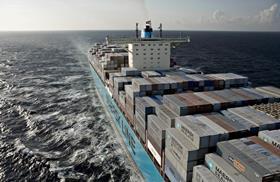
Shipping giant Maersk Line has announced that,as a response to both the short- and long-term market outlook, it is accelerating a number of already established cost and efficiency initiatives.
This initiatives include the reduction of its network capacity and the postponement of investments in new capacity, while at the same time reducing operating costs by escalating plans to simplify the organisation.
In light of lower demand these initiatives will allow Maersk Line to deliver on the ambition to grow at least in line with the market and to defend its market leading position.
Over the next two years, Maersk Line expects to lower the annual Sales, General & Administration (SG&A) cost run-rate by US$250m with an impact of US$150m in 2016. SG&A savings will be derived from already initiated transformation projects and the standardisation, automation and digitalisation of processes.
“We are on a journey to transform Maersk Line,' said Søren Skou. 'We will make the organisation leaner and simpler. We want to improve our customer experience digitally and at the same time work as efficiently as possible.'
Today, Maersk Line has 23,000 land based staff globally, but the group confirmed that organisational transformations and on-going automation and digitalisation will enable it to reduce the global organisation by at least 4,000 positions by the end of 2017, with the aim of minimising redundancies through managing natural attrition.
“We are fewer people today than a year ago. We will be fewer next year and the following year. These decisions are not taken lightly, but they are necessary steps to transform our industry,” added Skou.
As a response to the current market outlook, network capacity will be reduced in the fourth quarter of 2015 and throughout 2016. The closure of four services (ME5, AE9, AE3 and TA4) has already been initiated over the last two months and plans are in place to further cancel a total of 35 sailings in Q4.
Maersk Line will continue to manage capacity and does not plan to exercise the previously announced options for six 19,630 TEU vessels and two 3,600 TEU feeders and will postpone decision on the optional eight 14,000 TEU vessels.



